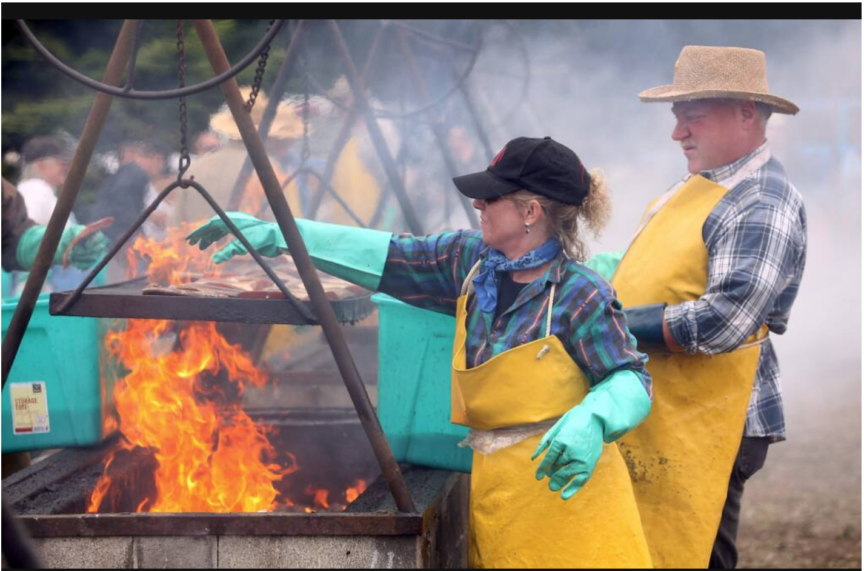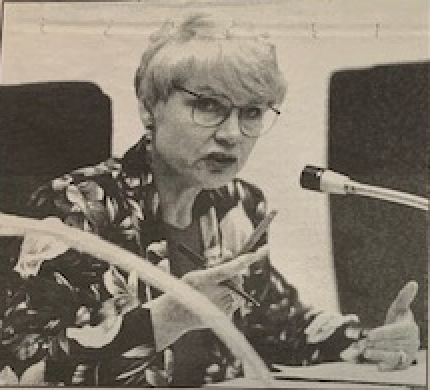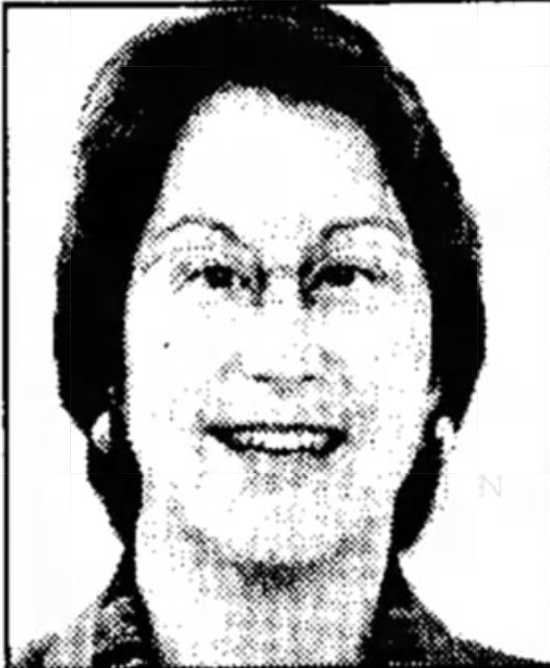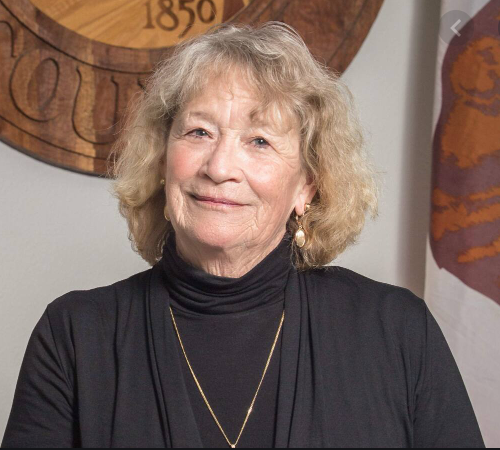Since 1859, just five elected women have served on Mendocino County’s board of supervisors.
By Suzanne Pletcher
In 1855—the same year that Isaac Singer patented his treadle Singer sewing machine and freed women from having to hand-stitch their family’s clothing—the new state of California required its counties to establish a board of supervisors. The three male members of the first Mendocino County board of supervisors met for the first time four years later and likely couldn’t imagine a woman ever joining their ranks.
It did happen, but it took 124 years. In 1983, Marilyn Butcher joined the board of supervisors, appointed by California Governor Duke Deukmajian to fill a vacancy. Every year since, at least one of five elected women has governed at Mendocino County’s seat of power: Butcher and Carre Brown represented the agricultural 1st District and Liz Henry, Patti Campbell, and Kendall Smith represented the north coast’s 4th District. Some of their terms have overlapped.
“Most groups I talk to find it pretty amazing that so few women have served on the board of supervisors,” said Brown, who is wrapping up her third term before stepping down.
A sixth woman, either Mari Rodin or Maureen Mulheren, will be elected this November to represent the Ukiah area 2nd District for the first time. The 3rd District including Willits saw Georgeanne Croskey represent it briefly as an appointee who didn’t seek election. And the south coast 5th District has never elected a woman to the board.
“It’s a big step to run for the board of supervisors, and not many women are willing to step up.”—Val Muchowski
“It’s a big step to run for the board of supervisors, and not many women are willing to step up,” said Val Muchowski, chair of the Mendocino Women’s Political Coalition. The Coalition encourages, trains, and promotes women interested in running for political office.
In news reports and interviews, the women who ran and were elected all prized the intellectual challenge of the job. They said campaigning was brutal. Four of them said their experience was that women are better at collaborating, seeking common ground.
Common ground was hard to find during those 37 years since 1983. The women’s terms of office spanned the tumultuous swell and fall of the county’s resource extraction economy. Timber was king, and several of the women met fierce resistance when they tried to steer the county toward sustainable forestry and fishing. The most recent leaders grappled with the enormous impacts of the monoculture marijuana industry and climate change.
Besides shepherding the county’s natural resources economy, the women tackled ongoing issues of mental health, housing, homeless populations, economic development, and county budget and infrastructure, “just to name a few,” Brown quipped.
Against the backdrop of the natural resources issues of their time, let’s meet these five women who stepped into the arena of local power and public service, who toughed out policy decisions of lasting impact on the families and communities they represented.
Marilyn Butcher, 1st District, 1983—1992

The same year Sally Ride became the fated first American woman to launch into space, Butcher made local history as the first woman launched into public service as an appointee. The following year, she made local history again as the first woman elected to the board of supervisors. A proponent of private property rights, Butcher lost her bid for a third term after a vitriolic campaign between pro-growth and no-growth citizens, some of the latter enraged by her support for housing developments and a Walmart store in Ukiah.
A friend called her “…a walking ice-breaker.”
A longtime friend called Butcher “a walking ice-breaker.” An extrovert and former TWA stewardess on the first transcontinental flights in the days when the job was glamorous, Butcher traveled the world before settling down in 1962 on a pear farm in the Ukiah Valley with her high-school sweetheart and husband, Gene. Her mother was a suffragette. Soon after Butcher settled in Ukiah, she embraced Republican causes and campaigns that led to her board appointment.
During her first term, the conservative board approved, according to a news account, the conversion of 13,000 acres of agriculture, timber and range land for development, much of it for hundreds of new homes and apartments in inland Mendocino County.
But the board shifted left during her second term when the environmental movement was swelling. In Mendocino County, Georgia Pacific and other timber companies had shaved the county’s hillsides of their forests at an alarming rate, which inspired the historic Redwood Summer of 1990 when thousands of protestors—desperate to save remaining patches of old-growth forests—spiked trees and blocked logging machinery. Butcher feared violence. She wanted the board to pass a proposed urgency ordinance that would regulate the size and composition of handles used for protest signs so they couldn’t be used as weapons. The ordinance did not pass.
As planning progressed for the giant protest, Butcher found herself at odds with new board member Liz Henry (Henry’s daughter joined the protest). In an effort to calm her colleagues’ mounting alarm, Henry organized a meeting between protestors, loggers, and the county board. At the meeting, according to news coverage, protest leader Judi Bari listed how organizers would ensure the protests remained peaceful, but then she reminded timber owners and loggers of their “lynch mob mentality” and said anonymous threats against her could have been made by someone in the meeting. Butcher rose, threw up her hands, and with the county sheriff stormed out. She later returned.
At the time, the county budget was severely stressed, a victim of the national recession caused by the savings and loan bank crisis and a lull in construction as a result of overbuilding. Plus, California’s Prop 13 had impacted property taxes that funded county services.
Butcher beat cancer before and during her board service but died of it at age 75. John Mayfield, a friend and former county supervisor who got her involved in politics, delivered her eulogy at a standing-room-only service.
Liz Henry, 4th District, 1989—1996
Of all the female supervisors—perhaps any supervisor—Henry endured exceptionally grueling election campaigns during her two terms. The Exxon Valdez oil spill had invigorated the environmental movement, and Henry, dubbed an environmentalist, was local timber industry’s public enemy #1. Her first campaign was “brutal,” she said after it was over, with “bridges burned.” Her re-election campaign ran into headwinds created by generous timber industry support for her opponent, and she won in a recount by three votes. Then a group led by four Fort Bragg women tied to the timber industry launched a recall against her.
It was a time of timber harvest reform, and the large companies wanted none of it. On the heels of Redwood Summer, Henry, Butcher and the rest of the board unanimously approved a resolution to “stop resource depletion and gradually maximize forest productivity.” They appointed a Forest Advisory Committee to come up with harvest rules that would nudge the industry toward sustainability. But under intense industry pressure, when it came time to approve the new rules, the board no longer had the votes. It wasn’t until Henry’s second term and a revised board of supervisors that new forestry rules were approved.
Of the recall, Henry declared in a news account, “I consider that intimidation…I’m not going to let this bother me.”
“They think they can legislate away poverty.”
Henry’s early childhood holds clues to why she never buckled. Known as Latvia Liz, as a child she fled the Holocaust and with her family settled in Crescent City, California, imbued with an unwavering respect for American freedoms. The widow of a state forester, she worked in social services in Ukiah, remarried, and was executive director of the Fort Bragg Senior Center when she ran for supervisor.
Her profession and background were suited to other volatile issues she faced on the board: illegal immigrants accused of taking scarce jobs during the recession and federal welfare reform of which she said, “They think they can legislate away poverty.”
Patti Campbell, 4th District, 1997—2004
A graduate of Fort Bragg High School and College of the Redwoods, Campbell joined the board the same year that millions worldwide mourned the deaths of Princess Diana and Mother Theresa. A Harris poll that year found that less than 10% of Americans had used the “world wide web” to access information, and Google search hadn’t yet been created.
Elected during a period of relative fiscal and political calm, the former Fort Bragg mayor and city councilor nonetheless was accused by environmentalists and her re-election campaign opponent for being too much of a collaborator.
“I’m a realist, I’m not superwoman,” she replied in a news account. “It’s not just me, it’s us working together. That’s my style.” Raised between two brothers, she said it helped her hold her own on the board. “You have to be a people person to do this job,” she said.
“I’m a realist, I’m not superwoman.”
Forestry became more sustainable during her term. Mendocino Redwood Company bought much of Mendocino County’s timberlands in 1998 and by the end of 2000 most of it was Forest Stewardship Council certified. Conservation groups sued the state to slow unsustainable corporate logging of publicly-owned Jackson State Forest.
The bad news was the commercial fishing industry. With increasing state and federal regulation, commercial fishermen were calling it quits, and Noyo Harbor found itself having to manage abandoned boats. Campbell wanted to renew the industry, but she wouldn’t support a grading ordinance to prevent erosion from choking salmon-bearing rivers.
With recovering forestlands and more vineyards than ever before, Campbell and the board welcomed a wave of income from tourism.
Medical pot was legalized in 1996 when Campbell was campaigning for office, and it was as if someone had thrown a switch and brought the underground industry into full light of day. After that, Mendocino County had a flourishing and lucrative cash crop that was quasi-legal. By Campbell’s second term, pot was reputedly the county’s largest industry, but no one knew for sure. The county’s agricultural commissioner had included its estimated value in the annual crop report of 1980, but its inclusion caused an enormous outcry from the board of supervisors. The commissioner said the $90 million estimate needed to be included in the report because even back then the underground crop was valued second only to timber. But without accounting to back up his estimate and sentiment against him, he stepped down from the job. Instead, in an effort to corral and quantify the crop, the board developed a personal use ordinance that voters passed in 2000. Called Measure G, it allowed 25 plants per site.
The issues most associated with Campbell’s terms were manmade, the political hot potatoes of garbage and coast cellphone service. The board endured excruciating neighborhood opposition to two sites it floated for an inland garbage transfer station. The board finally settled on Taylor Drive at the south end of Ukiah. On the coast, Cellular One wanted to bring cellphone service to the tourist town of Mendocino, but the town was dead set against it. Cellular One sued the county, and the board finally approved installation of a tower in the chimney of an historic Mendocino building.
Kendall Smith, 4th District, 2005—2012
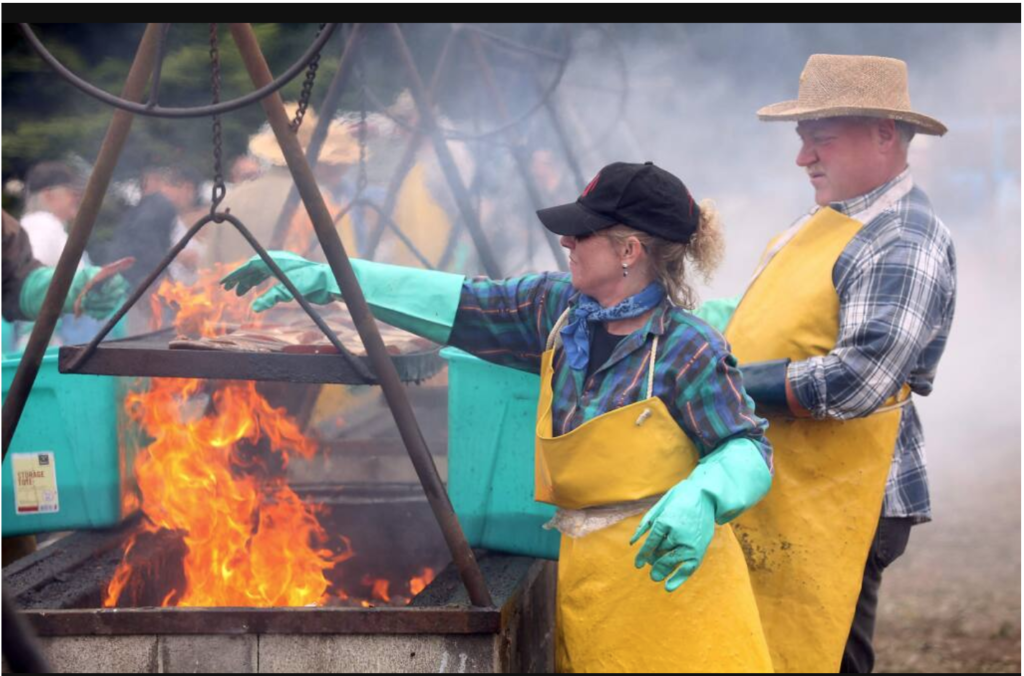
Smith entered the whirlwind of public service the same year that Hurricane Katrina decimated New Orleans with 174 mph winds. Considered liberal, she was a long-time coast employee of the county Department of Public Health who subsequently served six years as district representative for Congressman Mike Thompson before her run for a seat on the board.
Her terms were defined by two natural resource issues: sustainability of timber and fishing industries and marijuana as the county’s dominant industry. Also, she and the board made a major shift in county governance from a Chief Administrative Officer to a Chief Executive Officer. Every decision during her years on the board was weighted by the devastating impact of the 2008 recession.
The fishing industry took giant steps toward sustainability during Smith’s terms, though it was agonizing. In 2008, the federal government nearly sank it by closing commercial salmon fishing for two years. Quotas and other restrictions followed. Then the state placed parts of the county’s richest fishing grounds into marine protected areas. Smith worked closely with outraged fishery groups, trying to balance their needs with environmental protections that would ensure commercial fishing could endure. “Quite a bit of learning and study goes into that to really understand what those various perspectives are,” she said.
“It went from ‘take as much as you can’ to how to have that become a sustainable economy.”
A new community model of timber harvesting was being floated as well. “It went from ‘take as much as you can’ to how to have that become a sustainable economy,” with a holistic model that considers wildlife corridors, the role of tan oak trees, and the interface with fishing, she said.
Smith joined the board of the local Redwood Forest Foundation soon after she took office. The foundation’s 50,000-acre Usal forest sells carbon credits and sustainably harvests trees. “The whole issue of carbon sequestration has become a new economic factor in timber management,” Smith said.
Tempering the turn toward sustainability of the county’s traditional natural resources was the marijuana industry. Now a monoculture valued at $1.5 billion in a 2008 San Francisco Chronicle article, it had become the economic engine of the county. But there were serious downsides. Citizens complained about smell, deteriorating neighborhoods, shootouts, and pot wealth that did not benefit their communities. They demanded regulation. Before the state legalized pot in 2016, Smith and the board began a confusing series of regulations that, at one point, allowed 99 plants with zip ties. The ties could be purchased from the sheriff after an inspection.
The economic collapse “made decision-making very difficult,” said Smith. “When you have economic impacts such as the 2008 recession or the current pandemic, these things are going to challenge the strengths and resiliency of local government.”
Smith took flak for not joining county employees in taking a 10% pay cut, but she defended her decision. “The board of supervisors is the only group of employees that has received no raises over the past three years,” she said. “If I had received the same raises that other elected officials have, even with the 10% pay cut I would be making more than I am now.” Her response was met with jeers.
A silver lining was that voters taxed themselves to permanently rescue the county library system.
Carre Brown, 1st District, 2009—2020
A rancher, Brown joined Smith on the board as the housing bubble burst and the country—and county—were thrown into recession. The fifth generation descendant of a pioneering family whose patriarch helped found the Savings Bank of Mendocino County and was shot and killed by robbers while delivering a payroll via stagecoach, she was nicknamed Farmer Brown.
The nickname referred to Mendocino County’s traditional agriculture though, not the new one—marijuana. During her tenure, it was legalized and spread through the county’s forests and ranchlands at an unprecedented rate. By her third term, the value of the marijuana cash crop reportedly had far outstripped all other local industries combined by multiples. Citizen complaints continued unabated. Brown supported state legalization but said large commercial grows “are out of control” and have caused “serious public health and safety issues and environmental damage.”
When running for her third term, she said marijuana and groundwater would be her priorities.
But back-to-back natural disasters, exacerbated by climate change, grabbed center stage throughout her terms. On the heels of the recession came historic drought followed by wildfire that devastated Brown’s district of Redwood and Potter Valleys, followed by other wildfires and utility power shutoffs.
“When I look back at my terms of office, it’s been quite a journey,” said Brown of the past 12 years.
Two natural disasters forced her into emergency leadership. Brown was losing sleep because Brooktrails and Willits had just weeks of water left, so she convened a meeting of water managers and then persuaded the supervisors to declare a county drought emergency. “Boy did that turn into something,” she said. Brown made national and international news, and the county gained more than $6 million in drought resiliency funding.
“I have always felt that if you do not study then you are not doing your job.” —Carre Brown
She jumped to action again in 2017 when the deadly Redwood Valley Complex fire ignited across the irrigation ditch behind her ranch and decimated her district. “Our communities and our land are worth saving,” she said as she joined a host of federal, state, county and volunteer helpers to manage the crisis.
She safeguarded the Potter Valley Project that supplies electricity and water to her district as well as communities to the southern county line and beyond. “It’s an economic engine that runs year-round for our county. It’s not seasonal like tourism,” she said.
Brown noted the enormous amount of reading required to prep for every board meeting. “I have always felt that if you do not study then you are not doing your job,” said Brown.
